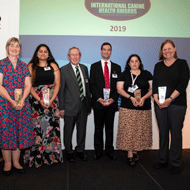
Awards ceremony honours five for genetics work
Five veterinary professionals and researchers have been recognised for their work to tackle inherited diseases in dogs at this year’s International Canine Health Awards.
The awards ceremony, organised by the Kennel Club Charitable Trust, recognises innovative researchers, veterinary scientists and students who have a significant impact on dog health and wellbeing.
Winners were chosen by a panel of respected vets and scientists and awarded prize money to further their work in the field of canine research.
The 2019 awards went to:
Dr Danika Bannasch, awarded £40,000 for the International Award: Dr Bannasch has been responsible for developing DNA tests for seven canine diseases, affecting millions of dogs worldwide.
Associate professor Gary Johnson, awarded £10,000 for the Lifetime Achievement Award: Johnson’s lab at the University of Missouri offers around 40 different genetic tests and his work has generated 153 whole genome sequences in dogs of various breeds, diagnosing 83 different heritable diseases.
Adrian Baez-Ortega, awarded £10,000 for the Postgraduate Student Inspiration Award: This award will help Adrian to further his research into the evolution of canine transmissible venereal tumours, which is likely to have fundamental importance in developing new treatment methods.
Nivan Mamak, awarded £5,000 for the Undergraduate Student Inspiration Award: Nivan is using advanced computer programming methods to investigate paroxysmal dyskinesia, a genetic disorder in golden retrievers.
Liz Branscombe, awarded £1,000 for the Breed Health Co-ordinator Award: Veterinary nurse Liz was recognised for her hard work educating pet owners about the health of flat-coated retrievers.
Professor Steve Dean, chairman of trustees of the Kennel Club Charitable Trust, which runs the International Canine Health Awards, said: “We are inspired to award these five talented professionals for their hard work and dedication into improving canine health and welfare.
“These people have demonstrated their commitment to increasing our knowledge and understanding of canine diseases and thoroughly deserve the awards they have been honoured with today. We want to thank them for their contribution to improving dog health, they are truly an inspiration.”
Image © ICHA



 The latest
The latest